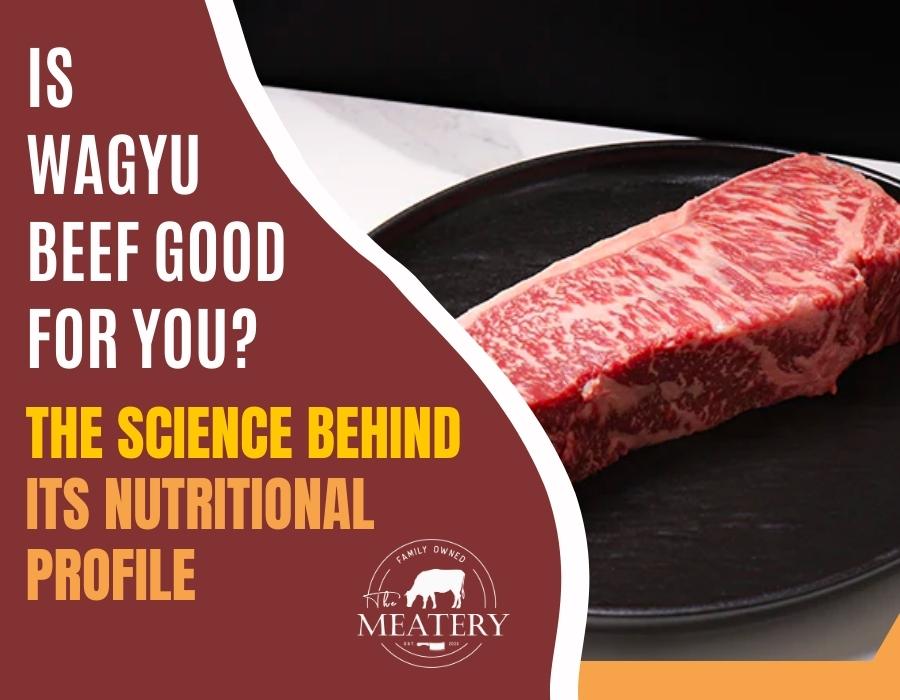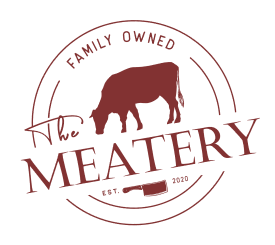Wagyu beef is a popular Japanese beef known for its high-quality, tender, and flavorful meat. It has become increasingly popular in the United States and around the world, thanks to its unique taste and texture. However, many people wonder if Wagyu beef is healthy, given its high fat content and the high price tag associated with it. In this article, we will explore the science behind Wagyu beef's nutritional profile. Also, answering some of the most common questions about this delicious meat.
Is Wagyu Beef Healthy?
One of the most common questions about Wagyu beef is whether it is healthy. While Wagyu beef does have a high-fat content, it also has a high concentration of monounsaturated fatty acids (MUFAs) and omega-3 and omega-6 fatty acids, which can have health benefits. MUFAs, in particular, have been shown to help lower cholesterol levels and reduce the risk of heart disease. Additionally, Wagyu beef is high in protein, iron, and zinc, making it a nutritious addition to any diet.
According to Lucas Irwin, a personal chef for athletes of ShapeShift Fitness:
"Wagyu beef is highly regarded for its exceptional marbling, contributing to its unparalleled taste, tenderness, and juiciness. However, beyond its gastronomic appeal, Wagyu offers several health and performance benefits for athletes and fitness enthusiasts that make it a fantastic investment."
Here are some of the health benefits of Wagyu beef:
Healthy Fats: Wagyu beef contains more monounsaturated fats, specifically oleic acid, which is linked to improved heart health and cholesterol levels.
Omega-3 and Omega-6 Fatty Acids: Wagyu beef is rich in these essential fatty acids, which help reduce inflammation, support brain health, and boost overall wellness.
Conjugated Linoleic Acid (CLA): Wagyu beef boasts a higher concentration of CLA, a fatty acid known to assist in fat loss, improve lean muscle mass, and support a strong immune system.
Flavour and Satisfaction: The unmatched taste and texture of Wagyu beef can enhance satiety and enjoyment, making it easier for athletes to adhere to their nutritional plans.
What is the Nutritional Value of Wagyu Beef?
Wagyu beef is a good source of protein, iron, and zinc. A 100 oz serving of Wagyu beef provides approximately 25 grams of protein, which is essential for building and repairing muscles. It also contains about 10% of the recommended daily value of iron, which is essential for carrying oxygen in the blood, and 36% of the recommended daily value of zinc, which is important for immune function and wound healing.
How Much Protein is in 100 oz of Wagyu Beef?
As previously mentioned, a 100-gram serving of Wagyu beef contains approximately 25 grams of protein. This is comparable to other high-protein foods such as chicken breast and salmon.
Is Wagyu Beef Lean or Fatty?
Wagyu beef is known for its high fat content, which contributes to its unique flavor and tenderness. However, not all Wagyu beef is created equal. The level of marbling, or intramuscular fat, can vary depending on the grade of the beef. A5 Wagyu beef, which is the highest grade, has the most marbling and is the most tender and flavorful. While it is higher in fat than other types of beef, it is still a good source of protein and other nutrients.
Is Wagyu Beef Good for Diabetics?
While Wagyu beef is high in fat, it can still be part of a healthy diet for diabetics when consumed in moderation. The protein and fat content of Wagyu beef can help regulate blood sugar levels, and the high concentration of MUFAs can have a positive impact on cholesterol levels. However, it is important to watch portion sizes and balance your intake of other foods to maintain a healthy diet.
Wagyu Beef for Athletes: Is It Worth the Investment?
For athletes seeking optimal performance and recovery, the quality of their diet plays a crucial role, and Wagyu beef offers notable advantages. Rich in monounsaturated fats and high-quality protein, Wagyu beef supports muscle repair and growth, essential for athletic performance.
The elevated levels of oleic acid found in Wagyu beef can aid in reducing inflammation, which is beneficial for recovery after intense training sessions. Additionally, the high concentration of conjugated linoleic acid (CLA) in Wagyu beef helps with fat loss and lean muscle gain. Our A5 Wagyu Ribeye at The Meatery exemplifies these benefits, offering a premium choice for those aiming to optimize their physique and overall fitness. This cut not only enhances your meals but also supports your fitness goals with its exceptional nutritional profile.
Moreover, the unique flavor and tenderness of Wagyu beef can enhance meal satisfaction, making it easier for athletes to adhere to their dietary plans.
While Wagyu beef is a premium product with a higher price tag, its nutritional benefits—such as improved heart health, better cholesterol levels, and enhanced recovery—may justify the investment for serious athletes and fitness enthusiasts. Integrating Wagyu beef into a balanced diet can provide both the taste and the nutritional edge needed for peak performance.
How to Include Wagyu Beef in a Balanced Diet
Incorporating Wagyu beef into a balanced diet can be both enjoyable and beneficial, thanks to its rich flavor and nutritional profile. Start by planning your meals to include Wagyu beef as a protein source, but be mindful of portion sizes to maintain a balanced intake.
A serving size of around 3 to 4 ounces is ideal for providing high-quality protein while keeping fat consumption in check. Pair it with a variety of vegetables and whole grains to ensure a well-rounded meal. For instance, our A5 Wagyu Striploin, when grilled, can be served with a side of quinoa and a colorful salad, offering a mix of nutrients and flavors. This combination not only enhances the meal but also helps you enjoy the exceptional taste and nutritional benefits of premium Wagyu beef.
Additionally, consider using Wagyu beef in recipes that allow it to shine without overwhelming your diet. Incorporate it into stir-fries, stews, or tacos where it can be complemented by plenty of vegetables and whole ingredients.
By using Wagyu beef as an accent rather than the main component of every meal, you can enjoy its unique taste and benefits while maintaining a balanced diet. This approach not only maximizes the nutritional advantages of Wagyu beef but also helps keep your meals varied and satisfying.
The Importance of Moderation: How Much Wagyu Should You Eat?
While Wagyu beef offers exceptional flavor and nutritional benefits, moderation is key to integrating it into a healthy diet. Due to its high fat content, including it in excessive amounts can lead to an imbalance in your overall fat intake.
A reasonable serving size of Wagyu beef is around 3 to 4 ounces per meal, which provides a generous dose of its premium nutrients without overwhelming your daily dietary balance. This portion allows you to enjoy the rich taste and benefits of Wagyu beef while keeping your intake of saturated fats within recommended limits.
To maintain a balanced diet, it's essential to enjoy Wagyu beef as part of a varied menu. Incorporate it into your meals a few times a week, alongside a variety of other protein sources, fruits, vegetables, and whole grains.
By using Wagyu beef as a special addition rather than a daily staple, you can reap its nutritional rewards and savor its quality without compromising your overall health and wellness. This approach ensures that you benefit from its unique properties while keeping your diet diverse and balanced.
Is Wagyu Beef a Good Choice for Special Diets? (e.g., Keto, Paleo)
Wagyu beef can be a great addition to special diets like Keto and Paleo, thanks to its rich fat content and high-quality protein.
For those following a Keto diet, which emphasizes high fat and low carbohydrate intake, Wagyu beef's high levels of monounsaturated fats, including oleic acid, align well with dietary goals. Its healthy fat profile helps maintain ketosis and provides essential energy, making it a valuable choice for Keto enthusiasts seeking a flavorful protein source.
Check out our Wagyu Steak Collection at The Meatery, which includes premium cuts like the A5 Wagyu Ribeye and Sirloin, ideal for Keto diets. This collection offers top-quality options that are perfect for satisfying your dietary needs with exceptional taste and tenderness
Similarly, Wagyu beef fits well into a Paleo diet, which focuses on whole, unprocessed foods similar to what early humans might have eaten. With its natural, unprocessed state and nutrient-rich composition, Wagyu beef supports the Paleo principles of consuming high-quality animal proteins.
Its nutrient density, including omega-3 fatty acids and CLA, complements the Paleo emphasis on nutrient-rich, wholesome foods. Just ensure that Wagyu beef is enjoyed in moderation and paired with other Paleo-friendly vegetables and fruits to maintain a well-rounded diet.
Conclusion: Experience Premium Wagyu Beef with The Meatery
Incorporating Wagyu beef into your diet offers valuable health benefits when enjoyed in moderation. Its rich profile of monounsaturated fats, essential fatty acids, and high-quality protein supports overall wellness and enhances various dietary regimens, whether for athletes or those on special diets like Keto or Paleo. Wagyu beef’s unique flavor and tenderness also make it a special treat for any occasion.
For the finest Wagyu beef experience, visit The Meatery. We offer premium cuts, including A5 Wagyu Ribeye and Striploin, ensuring exceptional quality and flavor with every purchase. Discover our collection to enjoy the exceptional taste and nutritional benefits of Wagyu beef, and elevate your culinary experience with The Meatery’s premium offerings.









